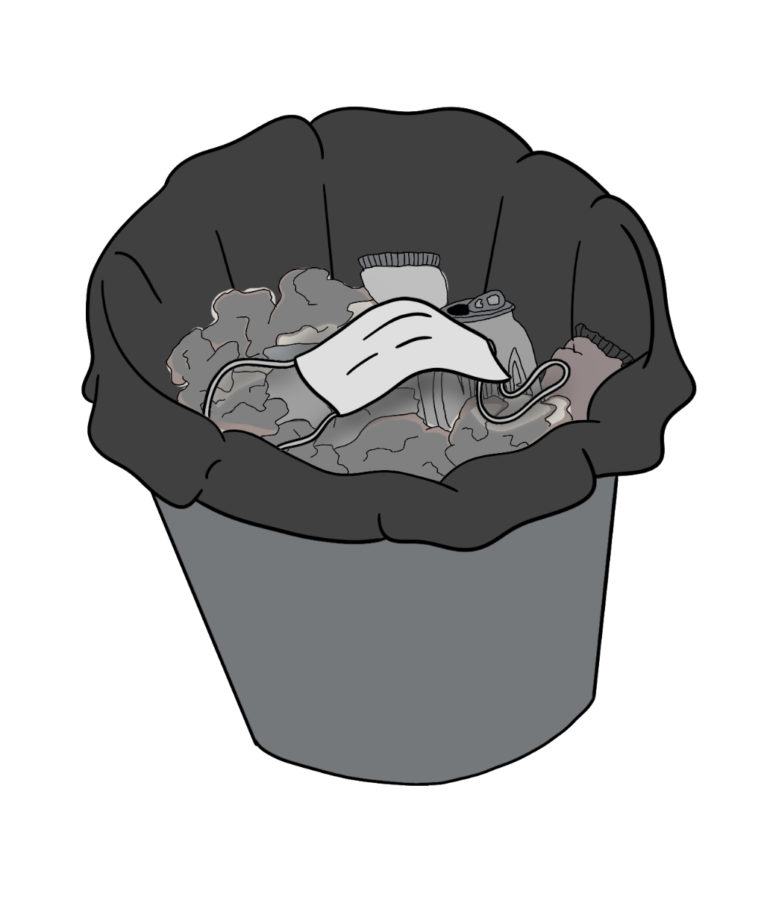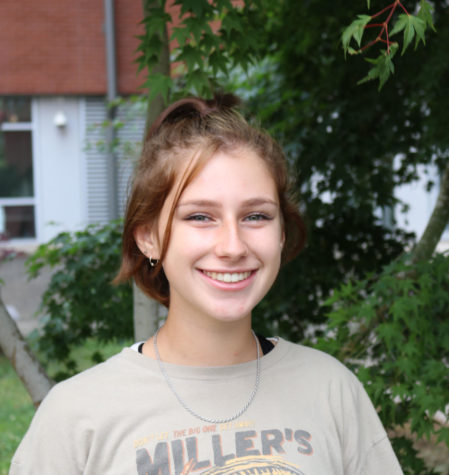Unmasking Shorewood
What students and staff really think about the lifting of the mask mandate
April 5, 2022
As the twists and turns of COVID appear to be coming to an end, there is still a uniquely modern question that needs answering: should I keep my mask on? Most students have been grappling with this dilemma throughout the last month. Following the announcement in early March that the mask mandate would be lifted, there has been a plethora of controversy.
This new rule regarding masks includes them not being required in most indoor settings, including schools, and became effective Saturday, March 12. Many students rejoiced at the prospect of unmasking in the classroom while others were upset and were hoping everyone would keep masks on at Shorewood.
Some argued that unmasking would jeopardize the health of immunocompromised students and staff. Mercy Haub, senior, is among the immunocompromised and has a lot of fear surrounding unmasking. “I had cancer last year and I am immunocompromised. I didn’t mount a very good response to the vaccine,” she said. Due to having cancer, Haub has experienced a lot of residual health concerns. Haub said, “My oncologists are really worried of what could happen if I get COVID,” and, “I have complications from treatment. I have chronic fatigue and chronic pain.”
Haub took to Instagram to air her grievances and quickly created a petition to keep masks on in Shorewood. “I was like, ‘I should just make a petition because I’m not gonna just be all words…I actually want to try to do something about this,’” she said.
Haub was not optimistic about actually changing the policy but the social media response she recieved was reassuring. “I didn’t have a massive amount of hope in terms of changing the mask mandate lifting, but seeing all those people…signing the petition to support me made me feel a lot more comfortable coming to school.”
Haub also sent an email to the superintendent, the school board, and the principal sharing her personal concerns regarding the mask mandate lifting. In her email she said, “You promise to help engage all students in learning. You are forgetting the immunocompromised students.” Haub feels that lifting the mandate is unfair.
While students such as Haub felt nervous about the mask mandate lifting, others were excited with their newfound freedom. Kailas Sullivan, junior, has been quick to take advantage of the new rules. “I’m very happy. My face feels free again. I feel like I’m getting fresh air,” he said. Sullivan feels very optimistic about the mandate lifting, “It’s really exciting that we’ve made it through these last two years with quarantine…we’re actually starting to see some light at the end of the tunnel.”
Sullivan feels that it’s safe for the majority of the population to start unmasking. “A lot of people have COVID shell-shock. They’ve been so pumped full of fear for the past two years that they’re scared to take them off now,” he said.
Haub didn’t feel quite as elated. “I go to school terrified and I hate that,” she said. While the school understands the concern coming from students, they are following state and federal orders. Bill Dunbar, principal, explains that the decision was not his to make. “We were determined as one of the counties in the state that was low risk level,” he said. “I don’t have the authority to say ‘well at Shorewood we feel differently.’”
What many students don’t realize is that the school doesn’t really have a say when it comes to the mask mandate. “We’ve always followed what the health department recommends for schools,” Dunbar said. Dr. Susana Reyes, Shoreline School District superintendent, holds the same sentiment as Dunbar. Reyes does not have the individual power to change the policy. “We prepare information that we share with our staff, our students, and our community,” Reyes said. According to Reyes the updates that every student gets comes through a list of authorities, “It’s sort of a channel or a chain of information,” she said.
Reyes trusts that authorities above her have made the right calls as far as mask mandates go. “We’ve been following the science that has been reviewed and monitored and responded to by the governor’s office and the department of health,” she said. “They’re the health experts, we’re not.”
Sullivan has, like the state and schools, chosen to trust the Centers for Disease Control and Prevention (CDC) as he has been throughout the pandemic. “It’s been heavily pressured…to follow the CDC guidelines, and I am following the CDC guidelines,” he said. Sullivan feels that the CDC made an informed decision based on the current state of COVID cases. “The CDC says it’s not mandatory and COVID deaths are way down the drain,” he said.
Haub feels as if immunocompromised people were left out when it came to the CDC’s decision to lift the mandate. “I wonder what [the CDC] thinks of people like me. Is our death acceptable because most people won’t die?”
Both sides of the coin have strong opinions on the lifting of the mask mandate, but the school and district encourages students to remain respectful. Dunbar and Reyes want students to think for themselves. “I hope students feel comfortable making an informed choice of their own,” Dunbar said. “Nobody should have to explain themselves,” and, “I don’t want anyone giving anyone else a hard time.” Reyes agrees with Dunbar. “I encourage students to be really respectful of each other, to care for each other,” she said.
While the majority of the student body didn’t jump at the opportunity to take off their masks on the first day like Sullivan did, he feels that others will soon follow suit. “A lot of people seem to be testing the waters,” Sullivan said. “I would encourage those who feel comfortable with it [to take off their masks].” Reyes is unsure of whether students will continue to unmask or not but thinks that COVID data will play a role. “Once we know what numbers end up doing, that might inform what will happen,” she said.
“I think people will continue to unmask,” said Haub. “[Lifting the mandate] felt a little premature to me because the Omicron surge had been so extensive.” Haub hopes that most students will continue to mask, but students feel a level of pressure coming from both sides of the argument.
“There’s a potential for a lot of hostility,” Haub said. “I’ve had conversations where I’ve been ridiculed for asking someone to wear a mask.”
Sullivan can also sense that hostility. “I feel a little bit of that pressure with the amount of people who still are wearing masks or a glance you get from time to time,” Sullivan said. But overall he feels confident in his decision. “It’s a personal choice. It’s not up to [other people] to make those choices for me.”
Sullivan feels comfortable in his choice, but he understands how others might not feel the same. Sullivan can see how students may feel insecure or scared of judgment. “People’s personal choices revolve around what others will think of them,” he said. Sullivan also sees how wearing masks make others feel more at ease and doesn’t urge anyone to unmask before they’re ready, “These safety precautions make [others] feel better [and] safer, and if that allows them to go to the store and go out or go to school without worrying then that’s good for them,” Sullivan said. “People just need to do what’s comfortable for them right now.”
Reyes also thinks that it’s a personal decision that every person should have the liberty to make. “People are going to make the decision thoughtfully, whether it’s to wear their mask or opt not to. It’s really their choice,” she said.
While Haub hopes people will continue to wear masks around her and other immunocompromised people, she understands that it is a personal choice at the end of the day. “It’s totally valid not to want to wear a mask, but it’s also valid for me to express that even though you don’t want to wear a mask you will have people around you that might be…immunocompromised.”
She hopes that people will think critically about their choice. “I want people to think about the implications their actions can have that maybe people didn’t consider.” Reyes understands how the lifting of the mask mandate has been stressful for immunocompromised students. “There’s some people in our community who do face medically challenging situations that we need to be aware of,” she said.
Sullivan feels that many don’t really care about truly protecting others. “[People] aren’t actually invested in the health of others. They’re just invested in being on the moral high-ground,” he said. Sullivan has seen many students that have been unmasked in groups and breaking CDC guidelines throughout the whole pandemic. “If [people] aren’t continuing those values for themselves outside of school then it’s more of their political holy-ness,” he said.
A big concern for many students is the potential for another wave of COVID to sweep through Washington and Shorewood. “If things change and get worse again we’ll all go back to masks and the mask mandate,” Dunbar said. Sullivan suggests that the best way to prevent another wave from happening is to individually quarantine. “If you’re feeling sick, stay home, don’t come to school,” Sullivan said. Haub hopes that another wave is not on the horizon, but she admits that COVID is “an ever-evolving situation” and anything could happen.
Reyes hopes there won’t be another wave but continues to keep an eye on the number of cases. “We’re tracking and reporting back to the department of health,” she said. “We are making sure that we’re monitoring any spikes of incidents of Covid cases in our system.” Reyes cannot make the decision when it comes to the mask mandate within schools and looks to those with more knowledge on the topic. “We rely on [the health department’s] deep review and analysis of the science that leads to their guidance…to then implement them in our school districts,” she said.
Both Haub and Sullivan encourage open conversation regarding masks. “If someone has questions they can come up to me and we can work it out or I can at least give them my reasoning,” Sullivan said. Haub feels similarly in this regard, “Having conversations about the impact of [people’s] choices is very important,” she said.
Sullivan is open to discussions on the topic and doesn’t like the quiet judgment. “A lot of people are just silently judging each other instead of actually talking about the issues and working them out,” he said.
Students are feeling a level of tension but Dunbar and Reyes are not concerned about this. Reyes feels a lot of appreciation for our community. “I thank our students for being really wonderful…for being thoughtful and considerate,” she said. Dunbar also thinks Shorewood students will not have any problems respecting each other’s choices. Dunbar said; “I think our students are smart enough, mature enough, calm enough, focused enough on their education that it’ll be fine.”




